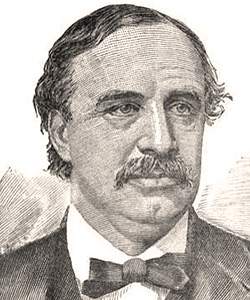Henry Villard (American National Biography)
Scholarship
[Heinrich Hilgard's] father wanted him to become a lawyer, but Villard was an indifferent student. When his father threatened to enlist him in the military, Villard immigrated to the United States in August 1853. He changed his name to Villard, after a schoolmate he admired, to make it difficult for his family to trace him and engaged in a number of jobs during his first years in the United States. Villard eventually found work as a journalist for German-language papers and later for English-language papers, covering the Abraham Lincoln-Stephen A. Douglas debates and numerous Civil War battles. In 1866 he married Helen Frances "Fanny" Garrison (Fanny Garrison Villard), daughter of abolitionist William Lloyd Garrison. They had four children. The marriage was fortuitous for Villard because it opened avenues to some of the wealthiest and most influential people in the United States, which proved to be invaluable later in his career.
Jon Huibregtse, "Villard, Henry," American National Biography Online, February 2000, http://www.anb.org/articles/10/10-01691.html.
Henry Villard (Appleton's)
Reference
VILLARD, Henry, financier, b. in Spire, Bavaria, 11 April, 1835. His name was originally Gustavus Hilgard. He was educated at the universities of Munich and Wllrzburg, and came to the United States in 1853. He studied law for a time in Belleville and Peoria, Ill., then removed to Chicago, and wrote for papers. In 1859 he visited the newly discovered gold region of Colorado as correspondent of the Cincinnati "Commercial," and on his return published a volume entitled "The Pike's Peak Gold Regions" (1860). He also sent statistics to the New York "Herald" that were intended to influence the location of a Pacific railroad route. He then settled in Washington as political correspondent for eastern and western newspapers, and during the war was an army correspondent. He married Fanny, a daughter of William Lloyd Garrison, at Washington on 3 Jan., 1866, went to Europe as correspondent of the New York "Tribune," returned to the United States in June, 1868, and shortly afterward was elected secretary of the American social science association, to which he devoted his labors till 1870, when he went to Germany for his health. While living at Wiesbaden he engaged in the negotiation of American railroad securities; and, when many companies defaulted in the payment of interest, after the crash of 1873, he joined several committees of German bond-holders, doing the major part of their work, and in April, 1874, returned to the United States to represent his constituents, and especially to execute an arrangement with the Oregon and California railroad company. On visiting Oregon, he was impressed with the natural wealth of the region, and conceived the plan of gaining control of its few transportation routes. His clients, who were large creditors also of the Oregon steamship company, approved his scheme, and in 1875 Mr. Villard became, president of both corporations. He was appointed in 1876 a receiver of the Kansas Pacific railroad as the representative of European creditors, and was removed in 1878, but continued the contest he had begun with Jay Gould and finally obtained better terms for the bond-holders than they had agreed to accept. The European investors in the Oregon and San Francisco steamship line, after building new vessels, became discouraged, and in 1879 Villard formed an American syndicate and purchased the property. He also acquired that of the Oregon steam navigation company, which operated fleets of steamers and portage railroads on the Columbia river. The three companies that he controlled were amalgamated, under the name of the Oregon railway and navigation company. He began the construction of a railroad up Columbia river, and failing in his effort to obtain a permanent engagement from the Northern Pacific company, which had begun its extension into Washington territory, to use the Columbia river line as its outlet to the Pacific ocean, he succeeded, with the aid of a syndicate which was called a "blind pool," in acquiring control of the Northern Pacific property, and organized a new corporation that was named the Oregon and Transcontinental company. After some contention with the old managers of the Northern Pacific road, Villard was elected president of a reorganized board of directors on 15 Sept., 1881. The main line to the Pacific ocean was completed, with the aid of the Oregon and Transcontinental company; but at the time when it was opened to traffic with festivities, in September, 1883, the "bears" of the stock market arranged an attack on the securities of the allied companies, and Villard, in the vain endeavor to support the properties, sacrificed his large fortune, and on 4 Jan., 1884, resigned the presidency of the Northern Pacific railroad. After spending the intervening time in Europe, he returned to New York city in 1886, and has since purchased for German capitalists large amounts of the securities of the transportation system that he was instrumental in creating, becoming again director of the Northern Pacific company, and on 21 June, 1888, again president of the Oregon and Transcontinental company. He has given a large fund for the State university of Oregon, liberally aided the University of Washington territory, founded a hospital and school for nurses in his native town, and devoted large sums to the Industrial art school of Rhenish Bavaria, and to the foundation of fifteen scholarships for the youth of that province.
James Grant Wilson and John Fiske, eds., “Villard, Henry,” Appleton’s Cyclopaedia of American Biography (New York: D. Appleton and Company, 1889), 6: 294.






